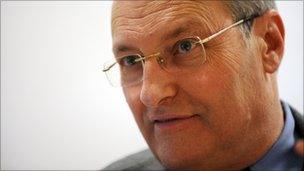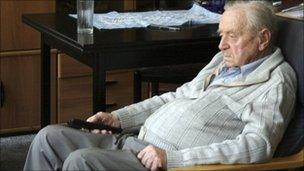Global Nazi investigations rise for a second year
- Published

Dr Efraim Zuroff says many countries have recently been motivated to prosecute former Nazis
The number of ongoing investigations into Nazi war criminals increased last year, says a report by the Simon Wiesenthal Center (SWC).
From April 2009 to March 2010 there were 852 investigations being conducted worldwide, compared with 706 during the same period in 2008/09.
The SWC also awarded Germany an A-grade for its efforts to prosecute ex-Nazis.
This is the first time its top grade has been given to any country other than the United States.
The period 2009-10 is the second consecutive year that the number of investigations into suspected Nazis has risen - there were 608 in 2007-08.
According to Efraim Zuroff, head of the SWC's Jerusalem branch, which investigates suspected WWII Nazi criminals, two cases were under investigation in Britain during 2009-10, but Scotland Yard has not yet confirmed this.
Mr Zuroff is also author of the SWC's annual report and said the rise in prosecutions was down to two developments.
"It's clear that we're reaching the end of the period in which this work will be possible. This has motivated countries with the political will to make an effort to prosecute former Nazis.
"There's now a greater sensitivity of Holocaust crimes and more knowledge of them.
"The other reason is that Germany in particular has changed its prosecution policy."
Germany's increase in cases is the most dramatic - from 27 in 2008-09 to 177 in 2009-10.
Mr Zuroff said Germany had changed its prosecution policy to allow more suspects - particularly those who were not officer class and those of non-German origin - to be prosecuted.
'Horrendous record'
He also said the SWC had changed the manner in which it gathered information of the ongoing cases in Germany, which had led to more cases coming to light.
"While there are still some problems in Germany, we have to give it the highest grade because of the progress it has made," he said. "We wanted to indicate our satisfaction with this."

Hungarian Sandor Kepiro is currently the SWC's most wanted Nazi suspect
Mr Zuroff also said Austria had a "horrendous record" on Nazi prosecutions, not having brought a case in more than 30 years, despite suspicion falling upon several people living within its borders.
Most notable of these is former Croatian police chief Milivoj Asner, accused of deporting hundreds to their deaths. He was charged in Croatia, but Austria has refused to extradite him.
However, the number of cases in Austria has also risen from five to 28, and Mr Zuroff said he was pleased that Austria had set up a "working group" last year to see if it was possible to bring any cases to trial.
This is the ninth annual report by the SWC, the first being in 2002 and covering the previous year.
Since January 2001, 78 indictments have been submitted against Nazi war criminals around the world, the majority in the United States, which also received an A grade for its efforts last year, despite a drop in the number of its ongoing investigations.
During the period from 2009-10, five individuals were convicted of Nazi war crimes, three in absentia in Italy and two in Germany.
'Most wanted'
This latest document gave nine countries failing grades for its investigative efforts - Norway, Sweden, Syria, Australia, Canada, Estonia, Hungary, Lithuania, and Ukraine.
The report also includes an updated list of the top 10 most wanted Nazis, as defined by the SWC.
The previous number one was John Demjanjuk, who is currently on trial in Munich, so currently top of the list is Sandor Kepiro, accused of organizing the mass murder of at least 1,250 civilians at Novi Sad, Serbia, in 1942.
He was convicted in Hungary in 1944, but never punished. Hungary has not implemented his original sentence but opened a new criminal investigation against him more than three years ago.
Mr Kepiro has accused Mr Zuroff of libel and initiated criminal proceedings in a Budapest court last year.
In his recent book Operation Last Chance, Mr Zuroff had indicated he may soon cease to produce these annual reports.
However, he has reconsidered this in the light of the recent increase in investigations.
"Given the positive developments in Germany it would be silly to end my work now," he said.